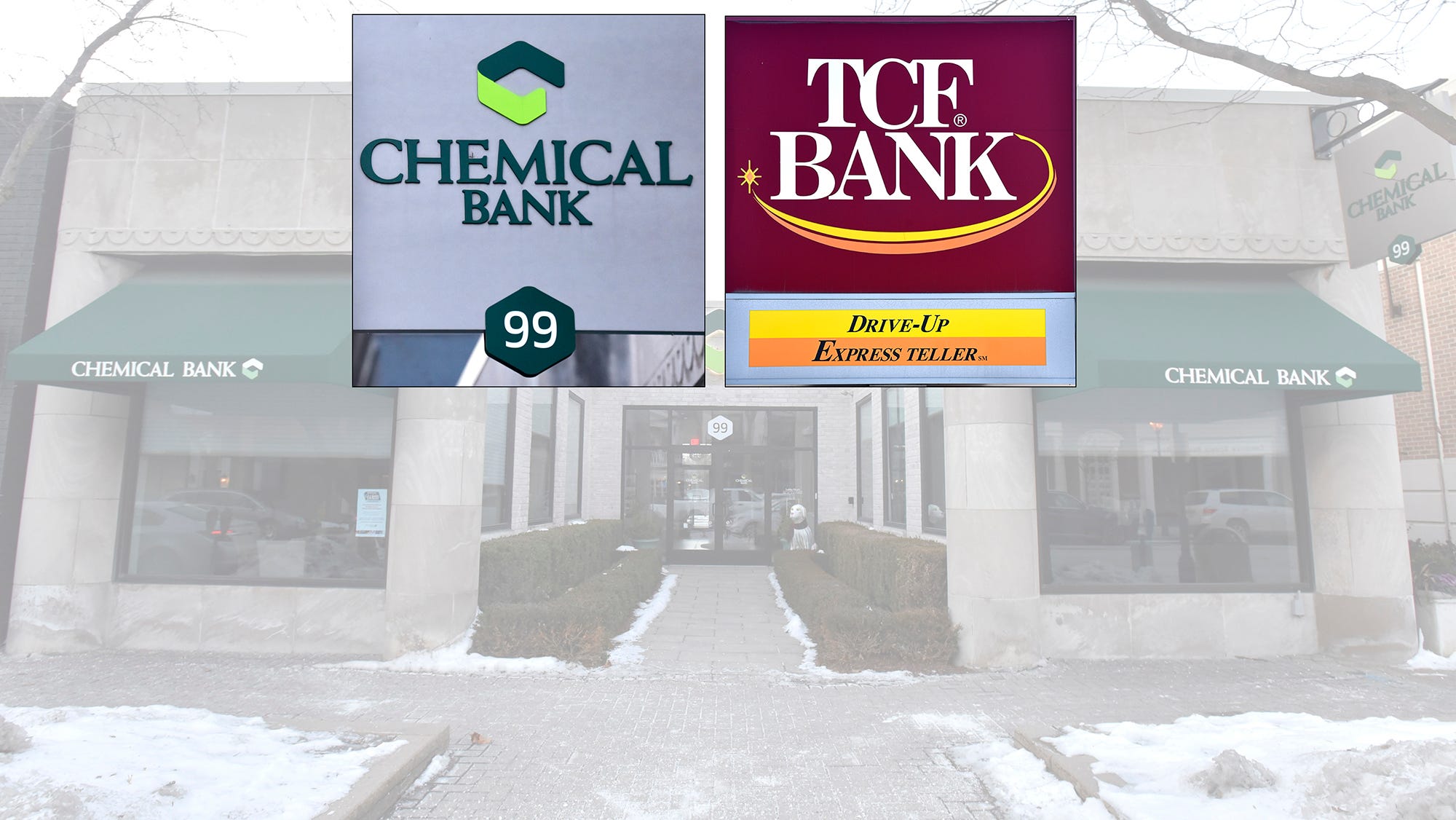Chemical Bank, TCF Bank plan merger headquartered in Detroit
 Breana Noble
Breana Noble
Detroit — A proposed merger announced Monday between Chemical and TCF banks is expected to bring more jobs to the city, grow the tax base and expand philanthropic work being done to aid in Detroit's recovery.
The companies said Monday they intend to combine under the TCF Bank brand to create one of the largest 50 banks in the country with its headquarters in Detroit. The bank will maintain significant presences in such markets as Chicago, Midland and Minneapolis.
"(The merger) will provide much more robust opportunity for Detroit and Michigan," Chemical Financial Corp. Chairman Gary Torgow told The Detroit News on Monday.
"It'll bring more people, more talent, more high-paying jobs. It's been a long time since we had a bank headquarters in downtown. We've found great partners in TCF. Their CEO, Craig Dahl, understood how important Detroit and Michigan is. We're high on the state of Michigan. They're high on it, too."
Pending regulatory approval of the deal, the new company would be twice as large as Detroit-based Chemical Financial Corp. with $45 billion in assets and a $7 billion market capitalization.
Since Comerica Bank moved its headquarters to Dallas, Texas, in 2007, it left Ally Financial Inc. as the only major bank still based in Detroit. Comerica, which traces its roots in the city to 1849, had $58 billion in assets (about $72 billion today) at the time.
“Given where Detroit and Wayne County were financially just a few years ago, this news says a lot about where we are today," Wayne County Executive Warren Evans said in a statement. "This merger will allow the region to be a player in the financial industry in a way it hasn’t in quite some time."
TCF's move to Detroit would likely bring more investment in philanthropic activities in the city, said Jerry Davis, associate dean for business and impact at the University of Michigan's Ross School of Business. In December, Chemical Bank pledged $5 million over the next five years to Detroit’s Neighborhood Strategic Fund.
"They're people who tend to serve on the boards of local nonprofits, and donations tend to be heavily focused in the headquarters' location," Davis said. "The banking business is a lot more personal than it might look. There are advantages to being embedded in the community.
"They know more about local color and what your needs might be. Bankers are likely to become aware of lending opportunities early because they're always on the prowl to make money."
As a result, the merger could also make the city more attractive for businesses, Davis said.
"Those are well-paid, stable jobs in Detroit," he said. "I imagine it will produce a reasonable flood of white-collar jobs who will buy in Detroit and start paying taxes."
The merger would double the number of branches in southeast Michigan for the banks’ customers, move more jobs to Detroit and "expand (Chemical’s) vision" to build its 20-story headquarters in Detroit, Torgow said.
Gov. Gretchen Whitmer said the announcement is good news for the economy and the state's future. Torgow was on her transition committee.
“If we’re going to ensure Michigan’s success, we’ve got to attract more businesses to create jobs and boost the local economies in cities like Detroit," Whitmer said in a statement. "This merger will create hundreds of jobs in the city, help local businesses attract the talent they need to thrive and provide investment throughout the state. I’m excited to work with everyone who wants to build a Michigan where more businesses move to for opportunity.”
'Merger of equals'
The deal between Chemical and Wayzata, Minnesota-based TCF Financial Corp. is an "all-stock merger of equals," according to the companies. It would grow TCF’s presence in the Midwest and expand Chemical’s footprint west.
Combined, the banks represent $34 billion in total deposits and more than 500 branches across nine states, including in four of the top 10 Midwest markets. Chemical's strengths in local business banking and TCF's in national lending also create a balanced loan profile, TCF Chief Financial Officer Brian Maass said.
The transaction is projected to deliver 17 percent and 31 percent earnings per share accretion to Chemical and to TCF by 2020 respectively. TCF shareholders will receive 0.5081 shares of Chemical common stock for each share of TCF common stock they own. Upon completion of the deal, TCF and Chemical shareholders will own 54 percent and 46 percent of the combined company, respectively.
While the market was down Monday, Chemical shares closed up 5.4 percent to $44.75 each and TCF's rose 5.3 percent to $22.72 each.
"By coming together, we are able to accelerate the growth of our business in a way neither company could have done alone in the near term," Dahl said during a conference call with investors and media. "This transaction truly does create the premier Midwest banking franchise by leveraging expertise across a larger shared platform."
With Chemical Bank's history of acquisitions and investment in its infrastructure and banking platform, the announcement does not come as a surprise, said Terry McEvoy, managing director at financial services firm Stephens Inc.
"I have always used Chemical Bank as a growth organization," McEvoy said. "That growth will be above and beyond the banking industry overall. The bank industry grows at the rate of the U.S. economy, but certain banks like Chemical have a strategy for growing faster."
Jared Shaw, managing director at Well Fargo Securities LLC, said he expected mergers and acquisitions to increase among mid-cap banks as they compete with larger banks.
"Over the last five years, there's been a big shift to digital delivery and digital customer acquisition," Shaw said. "The cost to incrementally invest in that is more expansive as a total expense for them compared to the biggest banks.
"By merging, TCF and Chemical can incrementally spend on one platform. The incremental cost of adding another account is less (than having two different platforms). It should be incrementally more profitable for them."
The deal is expected to save approximately $180 million by 2020 with "minimal reductions in branches," according to the companies. A majority of cuts will come from "back office support functions" and information technology inefficiencies, said Dennis Klaesner, Chemical's chief financial officer.
"Typical with mergers, there are lots of redundancies," said Klaesner during the conference call. "We don't have those redundancies, so we don't really anticipate cutting any customer-facing people."
Familiar names
The companies have decided to use the TCF name, a brand familiar to Detroit but has more reach outside Chemical’s core markets. It also could reduce confusion in the financial community with New York City’s Chemical Bank that acquired and was renamed as Chase Bank in the 1990s.
TCF has 6,000 employees and Chemical has 3,500. Torgow said the new company will have more than 9,000 employees across the country and there would be more employees in Michigan than there is now. The company has said previously it plans to add neighborhood branches in Detroit.
Chemical Bank leaders would retain three of the top four positions under the deal. Torgow would continue to chair the bank holding company. Chemical Financial Corp. CEO Dave Provost would chair the new bank board, and Chemical Bank CEO Thomas Shafer would be president and chief operating officer of the new bank.
Dahl would lead the new holding company and bank and work from Detroit and Minnesota. The two banks would split board seats evenly.
"Craig is also a true business leader and brings a track record of driving organic growth," Provost said during the conference call. "This fits very nicely with Chemical's entrepreneurial culture."

The merger plans follow Chemical’s July announcement that it was moving its headquarters from Midland to downtown Detroit. That includes the construction of a 400,000-square-foot mixed-use development at Woodward Avenue and West Elizabeth Street near Comerica Park, the Fillmore Detroit and the new Little Caesars Enterprises Inc. headquarters. The new building, which is being financed with no public funds, will include retail, offices, parking and luxury condominiums.
The $60 million investment was expected to bring more than 500 jobs to the city, some from various location scattered throughout southeast Michigan. Chemical has office space at 333 W. Fort St. where employees have begun to move in the meantime. The announcement of the move came with news that Chemical also would be the city’s primary banking partner for management of the city’s operating deposit accounts.
Chemical will retain its Midland workforce of more than 500 and continue to hold operations centers there as well as in Minneapolis and Chicago, Torgow said. Most of the bank's executive leadership is based in Troy. They will move downtown Detroit once the building is completed in 24 to to 30 months, Torgow said.
While Chemical Bank moving to Detroit might have been "traumatic" for Midland, UM's Davis said, that likely will not be the case for the Minneapolis area with TCF's departure. The Twin Cities are home to several Fortune 500 companies including Target Corp., U.S. Bancorp and Ameriprise Financial Inc.
"They have such a vibrant business community there," Davis said. "I don't think they are going to miss it, frankly."
Century-old roots
Chemical Bank traces its history back to 1917. It has 212 banking offices primarily in Michigan, northeast Ohio and northern Indiana.
The bank has closed a number of acquisitions since 2014 when it bought Traverse City-based Northwestern Bancorp Inc. for $121 million. It acquired Coldwater-based Monarch Community Bancorp Inc. for $27.2 million in 2015. Later that year, it paid $187.4 million for Holland-based Lake Michigan Financial Corp.

Chemical merged with Troy-based Talmer Bancorp Inc. in a transaction valued at $1.7 billion in 2016, making it the largest bank headquartered and operating branch offices in Michigan. At that time, Torgow became its chairman.
Chemical had $21.5 billion in assets at the end of December. In 2018, its net income was $284 million, the bank reported Monday. That is up 90 percent from 2017.
TCF Bank’s beginnings date to 1923. It has 315 locations in Arizona, Colorado, Illinois, Michigan, Minnesota, South Dakota and Wisconsin. Through its subsidiaries, it conducts commercial leasing and equipment financing in all 50 states and commercial inventory financing in all 50 states and Canada.
Most of TCF’s expansion has been through opening new branches, though it has made a few acquisitions including Ann Arbor-based Great Lakes Bancorp Inc. for $195 million in 1994. More recently it bought California indirect auto lender Gateway One Lending & Finance LLC in 2011 and residential mortgage lender Rubicon Mortgage Advisors LLC, which had offices in Minnesota and North Dakota, in 2017.
TCF had $23.7 billion in total assets at the end of December. In 2017, its net income was $304 million, up 13 percent from 2017.
The merger is expected to close in the late third or early fourth quarter of 2019.
bnoble@detroitnews.com